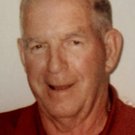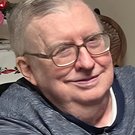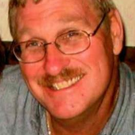Peter J.R. Buttner
Peter J.R. Buttner was a man who, by his own reckoning, worked to build a brighter future no matter how dark the present.
He did this in his personal life and in his professional life as director of Environmental Management for the state. He also did this for his community; when he lived in Guilderland, Dr. Buttner led a citizens’ board that pushed to have toxic waste removed from an abandoned Army depot.
He died on Monday, April 27, 2015. He was 83.
Born in Brooklyn, New York, he was the son of the late Peter and Margaret (née Flood) Buttner.
In 1985, Dr. Buttner wrote a 16-page letter to his elder son, which his wife has shared. His exuberance shines through the details of a difficult childhood.
Dr. Buttner describes a series of “downscale” moves his parents made, ending at 69 Pilling Street in East New York. “We lived on the top floor of a wooden two-family house on a street that ended at the freight train tracks,” Dr. Buttner wrote. “The house was so poorly built that we were told not to press hard against the outside walls for fear that they might break through.”
The move brought a change in schools. As a sixth-grader, Dr. Buttner was “introduced to the straight and narrow ways by the stiff bamboo rods of the Franciscan Brothers for seven hours each weekday.” He had a business as a “moving man,” hauling goods — “most of the poor of those days didn’t have much to move” — in a massive trunk to which he’d attached baby-carriage wheels.
One day, someone left a cast-off puppy in his cart and Dr. Buttner had a companion that lasted him into manhood. He named her Jerry. As always, he saw the bright side of his situation. “Pilling Street was a great place for a yet-to-be disciplined puppy....It was a super street for stickball, punchball, and roller skating...East New York was a tough area and being a good ball player got as much respect as big fists.”
As a boy, Dr. Buttner — who lived in a family without a telephone or car — reached out to the world through his home-built shortwave radio. He was known as “Bugs Buttner” because of his penchant for collecting insects. He also collected turtles, spiders — he found a black widow in a rock-strewn lot — frogs, birds, and mushrooms.
“Mom was in the hospital most of the time we lived on Pilling Street,” he wrote; she suffered from mental illness. One summer, his father took Dr. Buttner and his brother to St. Vincent DePaul’s Home for Wayward Boys in Brooklyn, presumably so they could attend summer camp for free. But, when the brothers returned home from camp, no father met them at the train station. They made the long trek home and arrived hungry and exhausted. Rather than being greeted with open arms, they were sent to bed without supper. His father, Dr. Buttner wrote, “felt that we should remain in the home for boys for the next few years but our ‘self reliance’ had sabotaged the scheme. I caught the most hell, being the oldest.”
After graduating from high school in Queens, Dr. Buttner served in the United States Army in Korea during the Korean War. “While I was in Korea, I had an allotment of money taken from each paycheck and sent home to my folks so that they could put it in a bank account for me,” Dr. Buttner wrote his son. He also served as a “banker” for a buddy who “was a fabulous gambler,” and sent home his share of the winnings. He planned to buy a car, take an extended fishing trip in the western states, and go to Cornell University.
“Even though I was a grunt sergeant, I started to feel like a person of substance and dreamed of all the places that Jerry and I would visit once I was away from smelly, muddy and deadly Korea.” He returned home to find “my folks had spent all but about $600 of the thousands that I had entrusted to them for safekeeping. They made no excuse; they just did it and that’s that.” His parents had also sold most of his cherished ham radio gear.
This is when he wrote his son: “Complex lessons in trust and forgiveness. No matter how dark the present, I have always been able to construct a future that made the present tolerable. Always, there is the sweet smell of tomorrow.”
“He never was a victim, never ever,” said his wife, Natalia Prajmovsky Buttner, after reading those words out loud.
After Korea, Dr. Buttner went to Hofstra College on the G.I. Bill and majored in geology. Natalia Prajmovsky was a geology major at Hofstra, too.
She vividly remembers the first time she laid eyes on him. “Sputnik had just been launched...I walked into the geology office and Pete was there, showing the chairman pictures he had taken of the Russian orbiting satellite. He took great photographs....We got together,” Mrs. Buttner said, despite the fact she had been dating someone else at the time. “There was no one like Pete,” she said.
She was a senior, two years ahead of him in school. After she graduated, she got a teaching fellowship at Smith College and they had a long-distance relationship for two years.
Five years ago, the Buttners discovered shoeboxes filled with 600 letters they had written during their two years apart. “They were heart-wrenching to read,” Mrs. Buttner said.
After she earned her master’s degree and Dr. Buttner earned his bachelor’s degree, they moved to Rochester where he pursued his master’s degree at the University of Rochester. “We got married and lived on nothing,” Mrs. Buttner recalled with a laugh. Their first son, Steven, was born 10 months later, to be followed two-and-a-half years later by their second son, Gregory.
As Dr. Buttner pursued fieldwork in the Catskills, Mrs. Buttner recalls being home with a newborn baby, “no car, no washing machine, and no disposable diapers.”
To analyze his data on Devonion delta deposits, Dr. Buttner used a new tool — computers. “Computers were just coming in...Huge banks of them filled a room. You had to punch cards to use them,” recalled Mrs. Buttner. “Pete learned on his own how to do it so they asked him to teach.” He taught in the applied math department.
“That was a big step,” said Mrs. Buttner. “We could actually buy a house and live like normal people for a few years.”
The Buttners then moved to the Capital Region as Dr. Buttner pursued a Ph.D. in geology at the Rensselaer Polytechnic Institute. After graduating, he worked for the state, serving as director of Environmental Management for the New York State Office of Parks and Recreation from 1974 until his retirement in 1991.
Dr. Buttner served on a disaster preparedness committee that mapped out what effect natural disasters could have so that the state would be prepared. He headed a scientific advisory committee that sent experts to South Carolina after Hurricane Hugo struck in 1989.
Dr. Buttner flew in a plane 200 feet above the Carolina shoreline, taking more than 1,600 photographs. He then helped make computer models that showed what would happen if a storm like Hugo hit Long Island.
“Hugo is a great laboratory in which to study how a barrier system behaves,” Dr. Buttner told The New York Times in 1990. “A storm that size would basically wipe out Freeport, Merrick, Belmore, Wantagh,” and many other villages along the Island’s South Shore, where the model predicted 10 to 15 feet of flooding. The Hudson River would rise more than 28 feet at the George Washington Bridge, the model indicated.
Dr. Buttner gave a prescient warning at that time: “We’re fooled into thinking that we can fix the position of the beaches,” he told Eric Schmitt of The Times, sounding a warning on future development on barrier islands.
Also in the 1990s, Dr. Buttner was a leader on the Restoration Advisory Board that finally got federal funds to clean up toxic waste buried and forgotten at the old Army depot. He was deeply concerned about the effect the toxins could have on Guilderland’s drinking water supply. After he suffered a stroke in 2002, Dr. Buttner’s work on the advisory board was carried forward by his colleagues.
As involved as Dr. Buttner was with his work, he always made time for his family. “He was a great father, hands-on,” said Mrs. Buttner. “He was a scoutmaster.” Their younger son became an engineer and their elder son, a math teacher.
Dr. Buttner also loved to travel and enjoyed traveling the world with his wife. Together, they explored the Amazon, Machu Picchu, Iceland, New Zealand, China, the Alps, The Galapagos, Greece, Italy, and France, as well has many interesting places in North America, all of which he documented with his brilliant photographs. When not traveling, he enjoyed spending time with friends and family at his cabin in the Adirondacks.
The couple had honeymooned in the Adirondacks in 1960, stretching every penny by cooking meals on a Coleman stove. “But we had a spectacular time!” wrote Dr. Buttner.
“He was an outdoor person, not a city person,” said his wife.
When they returned from their travels — their last trip abroad was to China in 2001 — Dr. Buttner would often give lectures, accompanied by slides he had taken. He gave a series of lectures at the University at Albany, and spoke about China and Greece at the Guilderland Public Library.
He continued his boyhood love of fly-fishing — he tied his own flies — into manhood. Dr. Buttner and his pals would release the fish they caught. “Why kill a kindred survivor?” he asked.
He also continued operating a ham radio throughout his life. “He was always a gadget-type of guy, intrigued with mechanical things,” said his wife.
His life changed dramatically with his stroke in 2002 and, in his later years, with Alzheimer’s disease.
“The stroke affected his right side,” said his wife. “He was a very determined and focused man,” she said. Dr. Buttner worked at physical therapy and made remarkable progress, she said. “He could walk.”
Dr. Buttner suffered aphasia because of brain damage from the stroke. Always a verbal person, “He lost the gift of language. He could never speak or write,” said Mrs. Buttner. “It was immensely frustrating for him.”
Dr. Buttner, who had been raised as a Roman Catholic, converted to Russian Orthodox. “That was my influence,” said Mrs. Buttner. “He was very taken with the Orthodox Church.”
Dr. Buttner concluded the letter to his son by fondly reminiscing over his Adirondack honeymoon with Natalia. “And so began the great game of life: To learn to see and to see what is to be learned; to unravel the complex world of man,” he wrote. “Each explorer has a chance to discover that secret place that holds the mystery, the ambrosia, the smartest policy and the keys to his character; to develop a keen sense of creativity in finding the best approach, the smartest policy, the fullest life.”
****
In addition to his wife, Natalia Prajmovsky Buttner, Peter J. Buttner is survived by his sons, Steven Buttner and his wife, Kim Moody, of Poland, Maine, and Gregory Buttner and his wife, Darlene, of Colonie; his grandchildren, Jake Buttner Moody, Johanna Buttner Moody, Stephen Gregory Buttner, and Nicole Elizabeth Buttner; his sisters, Joan Buttner of Old Brookville, New York and Margret Wichterman of East Falmouth, Massachusetts as well as several nephews and a niece.
His brother, Richard Buttner, who had lived in Oceanside, New York, died before him.
A Panikhida service was held on April 30 at the Parker Brothers Memorial Funeral Home in Watervliet. On May 1, services were held from the funeral home and in St. Basil’s Russian Orthodox Church in Maplewood, New York. Interment, with military honors, followed in the Gerald B.H. Solomon-Saratoga National Cemetery.
Memorial contributions may be made to St. Basil’s Russian Orthodox Church at 6 Lansing Ave., Watervliet, NY 12189, or to the Alzheimer’s Association, 4 Pine West Plaza, Building 4, Suite 405, Washington Ave. Ext., Albany, NY 12205-5515.
— Melissa Hale-Spencer



